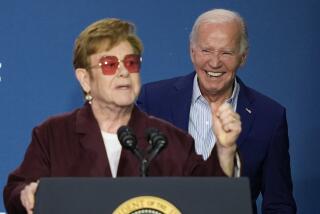Analysis: Gay marriage debate echoes battles of Clinton era
- Share via
WASHINGTON-- Having graduated to the role of elder statesman -- his thick mane gone white, the boom years now lauded by politicians of both parties -- it is clear the political transformation of William Jefferson Clinton has been among the most successful of recent past presidents.
It is thus easy to forget the stumbles that marked his tenure long before Monica Lewinsky became a household name, which offer instruction for today’s politicians.
The 1994 Republican revolution, when the GOP seized control of the House for the first time in four decades, was the obvious low point of Clinton’s first term (even if the overreach and foibles of one Speaker Newt Gingrich ultimately helped lift Clinton to easy reelection two years later.)
One of the most effective weapons in the Republican arsenal was gay rights or, more specifically, the controversy over allowing gays and lesbians to serve openly in the armed services. Clinton had pledged during the 1992 campaign to change the Pentagon’s policy, and when he sought to redeem that promise early in his term he immediately stirred a political storm.
The controversy galvanized Clinton’s conservative opponents but, perhaps even more damaging, helped turned independents against the president and fellow Democrats. Why, critics demanded, was the president focusing on gays in the military when there were far more important issues?
The argument has an echo in the current campaign: Why, critics and even some Democrats ask, did President Obama devote so much time to pushing healthcare reform when the economy was such a pressing matter?
Both sides seem to have learned a lesson, even as the politics surrounding gay rights have shifted with stunning rapidity. (It is telling that Obama finally repealed the jury-rigged “don’t ask, don’t tell” compromise on military service and, at least so far, it has been a non-issue in the presidential campaign.)
Regardless of what pushed Obama to finally announce his support for same-sex marriage -- his famously loquacious and untamed Vice President Joe Biden, a desire to give the women of “The View” something to talk about when he appears next week -- it is clear the president does not intend to spend a great deal of time dwelling on the issue.
While he brought it up Thursday night at George Clooney’s Hollywood fundraiser and at a prior stop in Seattle -- how could he not? -- it was not the crux of Obama’s message, even to those liberal audiences.
Even more noteworthy, though, was the response from prominent Republicans.
House Speaker John A. Boehner of Ohio put it bluntly: “The president can talk about it all he wants. I’m going to stay focused on what the American people want us to focus on, and that’s jobs.”
Former Massachusetts Gov. Mitt Romney, the presumptive Republican presidential nominee, restated his belief that marriage is, and should remain, a covenant between a man and a woman, then quickly moved on.
It’s a silence that speaks volumes.
Neither side expects the issue to be anywhere near decisive in November; if anything, the president’s support for gay marriage may very likely prove a wash, exciting liberals who might otherwise have been tepid toward Obama and inciting social conservatives who have been less than enthusiastic about Romney.
Clinton’s 1992 presidential campaign bequeathed a slogan that has become a moth-bit cliche: It’s the economy, stupid. His early miscues as president taught something else: It’s not politically smart to spend a lot of time talking about something that isn’t terribly important to a great number of people.
Put another way, the candidates must figure that if the voters don’t ask, why should I tell?
ALSO:
In N.C., Romney steers clear of controversy
Indiana Senate race less of a sure bet for GOP
The strange, intimate emails of the Obama campaign
More to Read
Get the L.A. Times Politics newsletter
Deeply reported insights into legislation, politics and policy from Sacramento, Washington and beyond. In your inbox twice per week.
You may occasionally receive promotional content from the Los Angeles Times.











